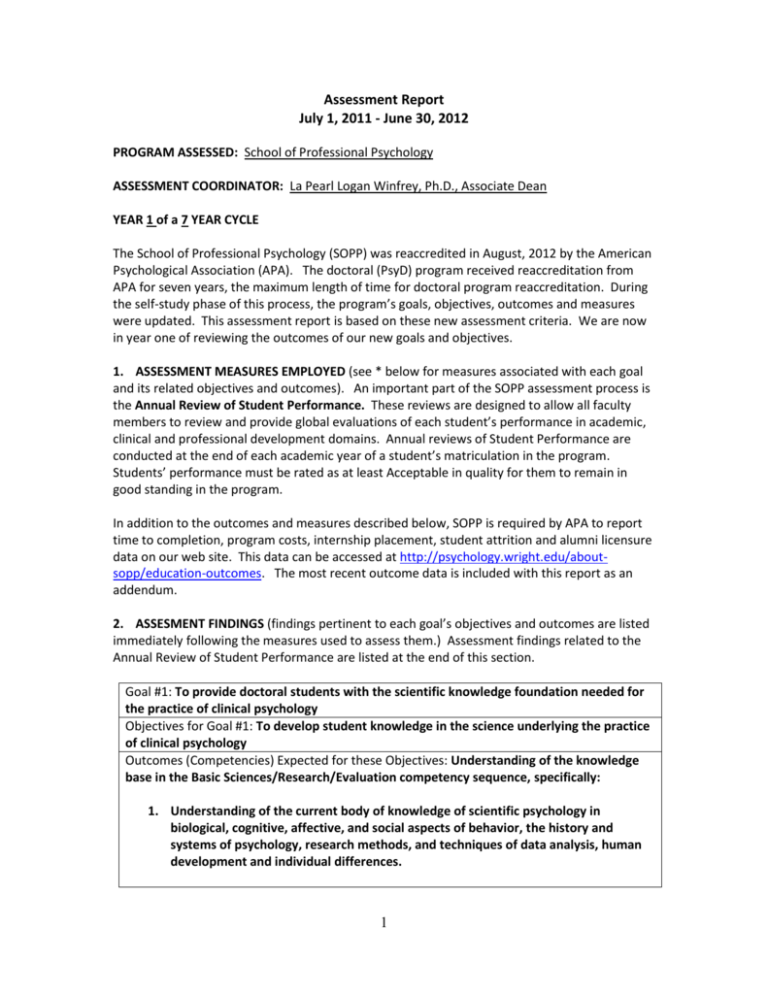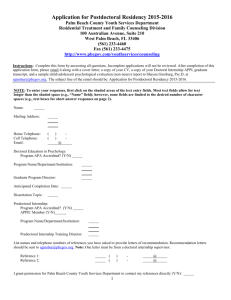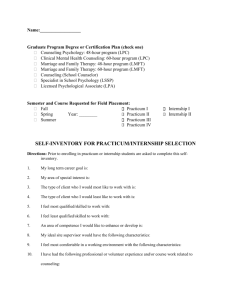2011-2012 Assessment Report
advertisement

Assessment Report July 1, 2011 - June 30, 2012 PROGRAM ASSESSED: School of Professional Psychology ASSESSMENT COORDINATOR: La Pearl Logan Winfrey, Ph.D., Associate Dean YEAR 1 of a 7 YEAR CYCLE The School of Professional Psychology (SOPP) was reaccredited in August, 2012 by the American Psychological Association (APA). The doctoral (PsyD) program received reaccreditation from APA for seven years, the maximum length of time for doctoral program reaccreditation. During the self-study phase of this process, the program’s goals, objectives, outcomes and measures were updated. This assessment report is based on these new assessment criteria. We are now in year one of reviewing the outcomes of our new goals and objectives. 1. ASSESSMENT MEASURES EMPLOYED (see * below for measures associated with each goal and its related objectives and outcomes). An important part of the SOPP assessment process is the Annual Review of Student Performance. These reviews are designed to allow all faculty members to review and provide global evaluations of each student’s performance in academic, clinical and professional development domains. Annual reviews of Student Performance are conducted at the end of each academic year of a student’s matriculation in the program. Students’ performance must be rated as at least Acceptable in quality for them to remain in good standing in the program. In addition to the outcomes and measures described below, SOPP is required by APA to report time to completion, program costs, internship placement, student attrition and alumni licensure data on our web site. This data can be accessed at http://psychology.wright.edu/aboutsopp/education-outcomes. The most recent outcome data is included with this report as an addendum. 2. ASSESMENT FINDINGS (findings pertinent to each goal’s objectives and outcomes are listed immediately following the measures used to assess them.) Assessment findings related to the Annual Review of Student Performance are listed at the end of this section. Goal #1: To provide doctoral students with the scientific knowledge foundation needed for the practice of clinical psychology Objectives for Goal #1: To develop student knowledge in the science underlying the practice of clinical psychology Outcomes (Competencies) Expected for these Objectives: Understanding of the knowledge base in the Basic Sciences/Research/Evaluation competency sequence, specifically: 1. Understanding of the current body of knowledge of scientific psychology in biological, cognitive, affective, and social aspects of behavior, the history and systems of psychology, research methods, and techniques of data analysis, human development and individual differences. 1 2. Appreciation of the interplay between the scholarly and scientific base of psychology and professional practice. 3. Development of attitudes for life-long learning. * How Outcomes are Measured and Minimum Thresholds for Achievement for these Objectives/Outcomes (Competencies): Grades of B or better in Basic Sciences course work Pass grade in 9 quarters of PSI 908, Practice Tutorial Pass grade in PSI 808, Professional Development Completion of the Professional Dissertation within the prescribed timeline prior to internship start ASSESSMENT FINDINGS: Grades of B or better in Basic Sciences course work: All students met this requirement. Pass grade in 9 quarters of PSI 908, Practice Tutorial: All students met this requirement. Pass grade in PSI 808, Professional Development: All students met this requirement. Completion of the Professional Dissertation within the prescribed timeline prior to internship start: Two students did not match for internship and subsequently extended their doctoral programs to reapply for internship and complete the dissertation requirement. Goal #2: To train culturally competent clinical psychologists. Objectives for Goal #2: Acquisition of knowledge, skills and attitudes necessary for culturally competent practice as a clinical psychologist Outcomes (Competencies) Expected for these Objectives: Demonstrate effective knowledge, skills, and attitudes in the Diversity competency, specifically: 1. Understanding of issues of power, privilege and oppression from self and other perspectives. 2. Understanding of the management of multiple identities. 3. Integration of theory and knowledge about multiculturalism with clinical practice. * How Outcomes are Measured and Minimum Thresholds for Achievement for these Objectives/Outcomes (Competencies): Grades of B or better in Diversity course work Expected annual performance (overall rating of 3 or higher or successful remediation) in the Diversity area of the Quarterly Progress Report (QPR) 2 ASSESSMENT FINDINGS: Grades of B or better in Diversity course work: All students met this requirement. Expected annual performance (overall rating of 3 or higher or successful remediation) in the Diversity area of the Quarterly Progress Report (QPR): All students met this requirement. Goal #3: To provide doctoral students with the skills and attitudes that will prepare them for the effective practice of clinical psychology. Objectives for Goal #3: To develop student knowledge, skill, and attitudes in the Relationship, Assessment, Intervention, Consultation/Education, and Management/ Supervision competencies. Outcomes (Competencies) Expected for these Objectives: Demonstrate effective knowledge, skills and attitudes in the Relationship, Assessment, Intervention, Consultation/Education, and Management/ Supervision competency areas, specifically: 1. Demonstrate knowledge, skills and attitudes necessary for the development and maintenance of effective professional relationships. 2. Demonstrate knowledge, skills and attitudes necessary for effective assessment and diagnosis, intervention, consultation/education, and management/supervision in clinical psychology practice. * How Outcomes are Measured and Minimum Thresholds for Achievement for these Objectives/Outcomes (Competencies): Grades of B or better in Relationship, Assessment, Intervention, Consultation/Education, and Management/Supervision course work (Applied Teaching Practice may be graded P/U) Pass grade in 9 quarters of PSI 908,Practice Tutorial Successful completion of 3 years of practicum Expected annual performance (overall rating of 3 or higher or successful remediation) in the Relationship, Assessment, Intervention, Research/Evaluation, Consultation/ Education, Management/Supervision and Professional Behavior sections of the Quarterly Progress Report (QPR) Global Evaluation of Pass on the CCE Completion of the Assessment Portfolio Completion of the CEMS Portfolio (Completion of required Activity Reports constitutes the CEMS Portfolio) 3 ASSESSMEMENT FINDINGS: Grades of B or better in Relationship, Assessment, Intervention, Consultation/Education, and Management/Supervision course work (Applied Teaching Practice may be graded P/U): All students met this requirement with two exceptions. A student earned a grade of C in PSI 812, Psychological Assessment III in Spring Quarter 2012; she subsequently remediated the course satisfactorily. Another student earned a grade of C in MBA 730, Financial Analysis & Decision Making in Summer Quarter 2012. This course would typically count toward SOPP credit in the Management/ Supervision competency area. She did not remediate the course and did receive SOPP credit for the course. Pass grade in 9 quarters of PSI 908, Practice Tutorial: All students met this requirement. Successful completion of 3 years of practicum: All 4th Year students were eligible for internship based on completing 3 years of practicum. Expected annual performance (overall rating of 3 or higher or successful remediation) in the Relationship, Assessment, Intervention, Research/Evaluation, Consultation/ Education, Management/Supervision and Professional Behavior sections of the Quarterly Progress Report (QPR): Three students had an overall rating of less than 3 on the QPR in the following competency areas: Assessment: 1 Research/Evaluation: 2 Consultation/Education: 1 Management/Supervision: 1 Professional Behavior:1 One student earned less than an overall rating of 3 in both Assessment and Research/ Evaluation. This student did an additional half-year of practicum as remediation. Another student earned less than an overall rating of 3 in Research/Evaluation. The student was placed internally for her final year of practicum to allow for close supervision. A third student earned less than an overall rating of 3 in Consultation/Education, Management/ Supervision and Professional Behavior. Administrative review of this student’s performance and ratings found her to be at expected level or above and deemed ready to move forward with internship. There were no students with an overall rating less than 3 on the QPR in the Relationship competency area. Global Evaluation of Pass on the CCE: A total of 27 students passed their Clinical Comprehensive Examination during this reporting period. 18 students passed on the first attempt, 2 students passed conditionally in the Assessment competency, 3 students passed conditionally in the Intervention competency, 1 student passed conditionally in the Sanitization requirement, and 1 student passed conditionally in the Assessment/Intervention competencies combined. All students who passed conditionally in a given area subsequently passed on retake or follow-up in these areas. Two students failed the Assessment competency initially and subsequently passed this requirement. Two other students deferred taking the CCE to next year and another student withdrew from the program. 4 Completion of the Assessment Portfolio: All 4th Year students met this requirement prior to leaving for internship. Completion of the CEMS Portfolio (completion of required Activity Reports constitutes the CEMS Portfolio): All 4th Year students met this requirement prior to leaving for internship. ASSESSMENT FINDINGS – Annual Review of Student Performance First Year Annual Review: A student’s performance was found to be unsatisfactory. She had not remediated a required course nor followed through with the DCT for Practicum. She was subsequently taken off the accelerated track and completed all required remediation. A student on the accelerated track was asked to meet with her academic advisor regarding professional development. A student was instructed to follow-up with her academic advisor regarding a disrespectful attitude. A student was instructed to follow-up with her academic advisor regarding unprofessional demeanor, unprofessional relationships and interpersonal style. A student was instructed to follow-up with her academic advisor regarding attendance problems in practicum, difficulty building rapport, and disorganization in data gathering. This resulted in two follow-up meetings with her academic advisor, second year practicum supervisor and the DCT. The student worked up to performing at expected level with no follow-up required. Second Year Annual Review: A student was identified with clinical concerns in practicum. A required mid-year review was conducted by the faculty advisor which indicated satisfactory progress and resolution of initial concerns. Third Year Annual Review: A student with problems meeting dissertation deadlines, writing assessment reports in Practicum, professional conduct, stress management and health concerns received extensive coaching from the faculty advisor. The student developed a detailed plan and was approved to extend the doctoral program to address these concerns. A student was directed to resources for a disability and was later approved to take a leave of absence due to family concerns. A student failed his Internship Readiness Review due to not submitting a full dissertation draft. He was otherwise performing satisfactorily. He is delayed a year in applying for internship and must complete his dissertation draft in the next year. 5 A student was approved to slow down his doctoral program to engage in self-care to help with performance difficulties in multiple areas. He will complete his dissertation draft and complete the CCE next year in the fourth year. Fourth Year Annual Review: A student who did not match for internship in March 2011 was approved to extend the doctoral program. The student reapplied for internship in Fall 2011 and was matched in March 2012. A student experiencing significant health problems withdrew from the program in Fall 2012. A student with significant family issues was approved to extend the doctoral program and submitted a detailed plan up to graduation. A second student who did not match for internship in March 2011 then experienced difficulty with completing and defending the dissertation. The student was approved to extend the doctoral program and completed the dissertation requirements. The student reapplied for internship in Fall 2011 but failed to match again in March 2012. The student worked with the OCT to develop a local internship experience for the student. A student who had not completed a required course to be eligible for internship completed the course in Spring 2012. NOTE: Students with at least a 3.80 GPA and an overall rating of at least 4.0 on the final Quarterly Progress Report received a Letter of Commendation. 3. RESPONSE TO ASSESSMENT FINDINGS: As part of Wright State University’s conversion from a quarter-to-semester (Q2S) curriculum, SOPP continued to develop the program’s academic calendar and modify course syllabi for review by the Graduate Council. The program is on track for full implementation of the Q2S conversion in Fall Semester 2012. During the 2011-12 year, the administrative structure of SOPP was reorganized. Dr. La Pearl Logan Winfrey assumed full duties as Associate Dean and Program Director while exercising supervision of a newly-created Director of Clinical Training position which became effective July 1, 2012. 4. ASSESSMENT ACTIVITIES FOR COMING YEAR: We will assess the same learning outcomes and employ the same measures identified in this report during the upcoming assessment year. For Program Goal #2: To train culturally competent clinical psychologists, we will add an outcome metric: average of student ratings of diversity coverage in each SOPP course. In 2012-13, the Curriculum and Clinical Training Committees will benchmark other doctoral clinical psychology (PsyD) programs relative to course curriculum, practicum, internship, etc. for comparison purposes and to identify best practices that may be adopted by SOPP. 6 We will update our Alumni Survey for use in Summer 2013 to coincide with administering our New Graduate and Satisfaction with the Doctoral Program surveys. In addition, we will administer our Program Evaluation survey to current SOPP students in Summer 2013. 5. UNIVERSITY LEARNING OUTCOME ASSESSMENT: SOPP will assess two University Learning Outcomes in its required courses. For 2014-15, the doctoral program will assess the outcome, “Demonstrate global and multicultural competence”. Data related to PSI 8190, Multicultural Lab; PSI 9800, Diversity Integration I; and PSI 9810, Diversity Integration II will be reviewed to assess this outcome. In 2015-16, we will assess the outcome, “Demonstrate understanding of contemporary social and ethical issues”. Data related to PSI 8030, Social Psychology and PSI 9660, Professional Ethics will be reviewed to assess this outcome. Enclosure: Student Admissions, Outcomes and Other Data 7





